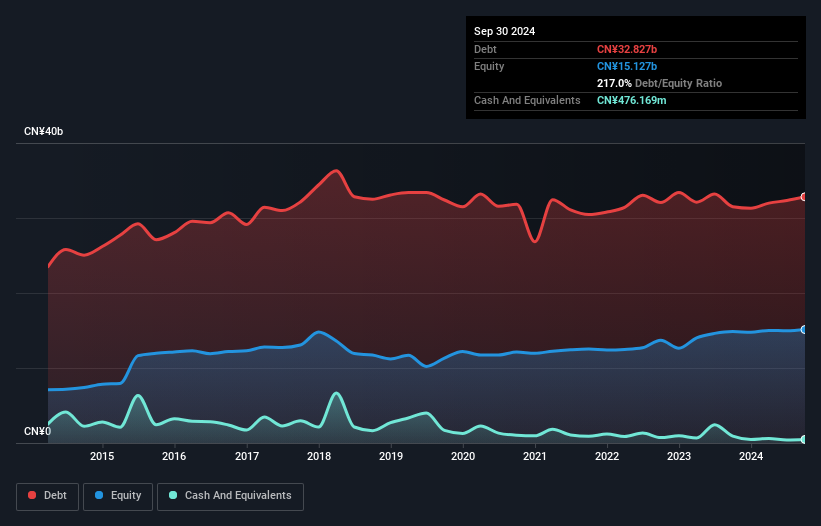
The external fund manager backed by Berkshire Hathaway's Charlie Munger, Li Lu, makes no bones about it when he says 'The biggest investment risk is not the volatility of prices, but whether you will suffer a permanent loss of capital.' So it seems the smart money knows that debt - which is usually involved in bankruptcies - is a very important factor, when you assess how risky a company is. As with many other companies Henan Zhongyuan Expressway Company Limited (SHSE:600020) makes use of debt. But the more important question is: how much risk is that debt creating?
Why Does Debt Bring Risk?
Debt and other liabilities become risky for a business when it cannot easily fulfill those obligations, either with free cash flow or by raising capital at an attractive price. Part and parcel of capitalism is the process of 'creative destruction' where failed businesses are mercilessly liquidated by their bankers. While that is not too common, we often do see indebted companies permanently diluting shareholders because lenders force them to raise capital at a distressed price. Of course, plenty of companies use debt to fund growth, without any negative consequences. The first thing to do when considering how much debt a business uses is to look at its cash and debt together.
What Is Henan Zhongyuan Expressway's Debt?
As you can see below, at the end of September 2024, Henan Zhongyuan Expressway had CN¥32.8b of debt, up from CN¥31.5b a year ago. Click the image for more detail. And it doesn't have much cash, so its net debt is about the same.

How Healthy Is Henan Zhongyuan Expressway's Balance Sheet?
Zooming in on the latest balance sheet data, we can see that Henan Zhongyuan Expressway had liabilities of CN¥5.45b due within 12 months and liabilities of CN¥30.6b due beyond that. Offsetting this, it had CN¥476.2m in cash and CN¥1.24b in receivables that were due within 12 months. So its liabilities outweigh the sum of its cash and (near-term) receivables by CN¥34.4b.
This deficit casts a shadow over the CN¥9.73b company, like a colossus towering over mere mortals. So we'd watch its balance sheet closely, without a doubt. At the end of the day, Henan Zhongyuan Expressway would probably need a major re-capitalization if its creditors were to demand repayment.
View our latest analysis for Henan Zhongyuan Expressway
We measure a company's debt load relative to its earnings power by looking at its net debt divided by its earnings before interest, tax, depreciation, and amortization (EBITDA) and by calculating how easily its earnings before interest and tax (EBIT) cover its interest expense (interest cover). Thus we consider debt relative to earnings both with and without depreciation and amortization expenses.
Weak interest cover of 2.1 times and a disturbingly high net debt to EBITDA ratio of 10.6 hit our confidence in Henan Zhongyuan Expressway like a one-two punch to the gut. The debt burden here is substantial. Fortunately, Henan Zhongyuan Expressway grew its EBIT by 4.3% in the last year, slowly shrinking its debt relative to earnings. When analysing debt levels, the balance sheet is the obvious place to start. But it is future earnings, more than anything, that will determine Henan Zhongyuan Expressway's ability to maintain a healthy balance sheet going forward. So if you want to see what the professionals think, you might find this free report on analyst profit forecasts to be interesting.
But our final consideration is also important, because a company cannot pay debt with paper profits; it needs cold hard cash. So the logical step is to look at the proportion of that EBIT that is matched by actual free cash flow. Considering the last three years, Henan Zhongyuan Expressway actually recorded a cash outflow, overall. Debt is usually more expensive, and almost always more risky in the hands of a company with negative free cash flow. Shareholders ought to hope for an improvement.
Our View
To be frank both Henan Zhongyuan Expressway's net debt to EBITDA and its track record of staying on top of its total liabilities make us rather uncomfortable with its debt levels. Having said that, its ability to grow its EBIT isn't such a worry. It's also worth noting that Henan Zhongyuan Expressway is in the Infrastructure industry, which is often considered to be quite defensive. Taking into account all the aforementioned factors, it looks like Henan Zhongyuan Expressway has too much debt. While some investors love that sort of risky play, it's certainly not our cup of tea. There's no doubt that we learn most about debt from the balance sheet. But ultimately, every company can contain risks that exist outside of the balance sheet. To that end, you should learn about the 2 warning signs we've spotted with Henan Zhongyuan Expressway (including 1 which is significant) .
Of course, if you're the type of investor who prefers buying stocks without the burden of debt, then don't hesitate to discover our exclusive list of net cash growth stocks, today.
Valuation is complex, but we're here to simplify it.
Discover if Henan Zhongyuan Expressway might be undervalued or overvalued with our detailed analysis, featuring fair value estimates, potential risks, dividends, insider trades, and its financial condition.
Access Free AnalysisHave feedback on this article? Concerned about the content? Get in touch with us directly. Alternatively, email editorial-team (at) simplywallst.com.
This article by Simply Wall St is general in nature. We provide commentary based on historical data and analyst forecasts only using an unbiased methodology and our articles are not intended to be financial advice. It does not constitute a recommendation to buy or sell any stock, and does not take account of your objectives, or your financial situation. We aim to bring you long-term focused analysis driven by fundamental data. Note that our analysis may not factor in the latest price-sensitive company announcements or qualitative material. Simply Wall St has no position in any stocks mentioned.
About SHSE:600020
Henan Zhongyuan Expressway
Engages in investment, construction and operation management of expressways in China.
Solid track record average dividend payer.
Market Insights
Community Narratives




